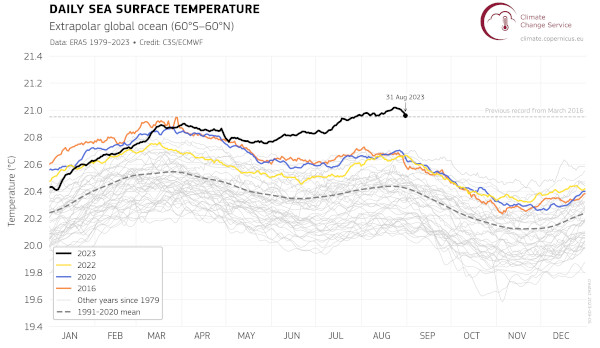
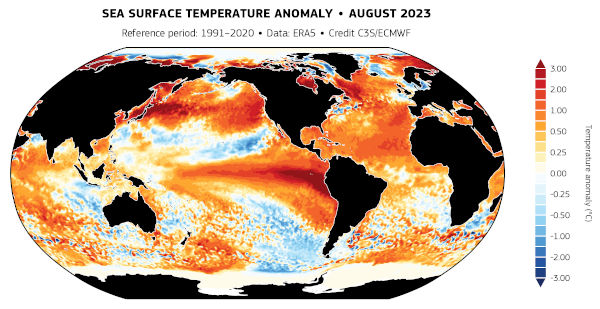
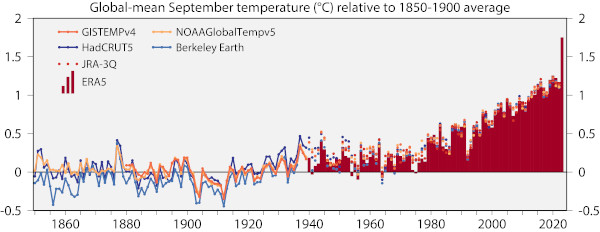
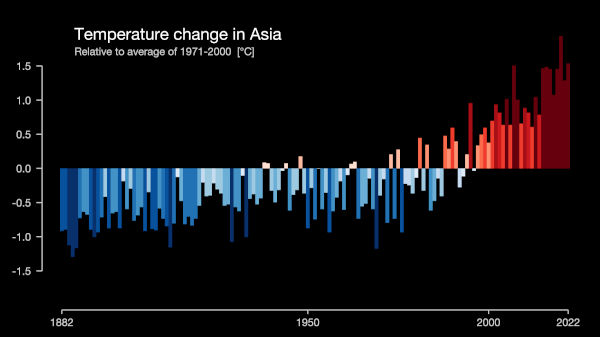
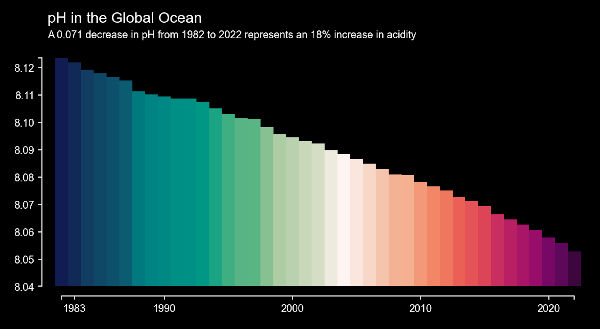
 | |
 | |
 | |
 | |
 |
NAV of the Apollo Asia Fund fell 0.2% in the third quarter, to US$2,605.55 (Series A); it was up 0.6% year-to-date. It's up 24% since December 2019, and 62% since the end of March 2020, when global markets had begun to rally after the initial pandemic slump. Over the 25-plus years since inception, compound annual growth has been 17%, and the NAV has multiplied 54-fold.
We live in interesting times - and one of the most interesting aspects this quarter was climate change. That in itself is striking: for most of my career, the practical implications of the future ecological crisis were difficult for many people to imagine, and far out beyond the investment horizon. The practical implications remain hard for many to imagine, and even harder to plan for, but recent extreme weather has delivered a wake-up call. Global warming is likely to exacerbate many other challenges.
I'd like to review a few striking charts, and the various perspectives now available. The surface temperature of the oceans has set record highs for five months in a row. Chart 1 shows the magnitude of the anomaly, and the growing divergence from past norms. What may change as a result of such high temperatures?
There have been remarkable differences in sea surface temperatures around the world, as shown in the map. Oceanic hotspots in September include Japan, Korea and Peru; countries with significant fishing industries. See the magnitude of the temperature anomalies there. Populations of sealife worldwide are already in alarming decline due to overfishing, pollution, and seabed destruction, so these high temperatures are one more stressor.
The oceans represent 99% of the biosphere, so are not to be ignored by landlubbers. The acceleration of change raises concerns for sea level rise, saltwater intrusion into groundwater, and disturbance to weather patterns... but also, what will be the impact of such rapid change on sealife?¹ We're already seeing some migration, and can assume that for many aquatic species this will be as challenging and disruptive as for humans and others on land.
Two years ago the G20 agreed to try to keep average global temperatures from rising more than 1.5℃ above the pre-industrial average. Until August, trends were alarming, but in line with climate models. The September figure leapt to 1.75℃ over the 1850-1900 average, and was memorably described as 'gobsmackingly bananas'; this unexpected deviation raises concerns that one or more tipping points may have been breached. Chart 3 shows the comparison with previous Septembers. More context is provided in the monthly climate bulletin from the EU's excellent Copernicus Climate Change Service, the source of our first three images.² The 30-year trendline is now at 1.24℃.
The ShowYourStripes website shows how temperature has changed over the years, for most countries and many cities. It shows that the global temperature in 2022 was 0.6℃ above the 1971-2000 average, and 1.2℃ higher than the pre-industrial average. (The first nine months of 2023 were 0.2℃ higher again.) Our fourth chart shows that Asia, after its rapid industrial growth, already has temperatures 1.5℃ above the 1971-2000 average and around 2.5℃ more than the pre-industrial norm.³
Our final chart shows another consequence of fossil fuel use, vividly displayed by Ocean Acidification Stripes.⁴ Please note the very different scale: the 18% increase in acidity has occurred over just 40 years. How much longer will we be able to eat shellfish? (and many other questions).
_ _ _
In recent years, I've very much appreciated the annual Cooler Earth conferences, organised by CIMB, and it was interesting to think about the changes since I last attended in person four years ago. Attendees last month had no doubt of the importance of the issue. Floods and landslides in Malaysia, crop failures, and disasters in high-income cities, have shown the potential for major disruption in the present, and not just in a distant future. Emissions reporting is recognised as a necessary requirement to keep doing business in the US and Europe, even if not for the rest of the world. Keeping up with corporate sustainability initiatives is likely to be advisable for most of the participants. CIMB is offering small improvements in the cost of finance to those in the forefront, which may pay for themselves in better credit quality as well as in customer-knowledge and marketing. The ability to help clients through the reporting thicket is a boon to organised banks and consultants, and a real commercial advantage for CIMB. The opportunities of the transition were emphasized.
However, it is far from clear that all the data collecting and reporting are achieving any improvement in overall environmental performance. On the contrary, usage of most resources continues to expand, and the space left for nature's ecosystems continues to contract, in Malaysia as around the world. A rational society might ban any expansion of polluting industries such as petrochemicals, while discouraging any further expansion of the industrial/commercial footprint, and substituting wellbeing for GDP growth as a target - but in our current world, resource grabs are the order of the day, and South East Asian countries are competing for data center investments despite growing concerns over their electricity and water consumption⁵. (As I write, many areas of this city are suffering a two-day water cut, one of many since 2020.)
The frustration of environmentalists and climate scientists is evidently shared by Pope Francis. In the new encyclical Laudate Deum, he outlines hopes for the upcoming COP28 conference: "We must move beyond the mentality of appearing to be concerned but not having the courage needed to produce substantial changes."
_ _ _
|
One unique set of risks in Asia stems from the major rivers arising in the Hindu Kush Himalaya, which has been described as the water tower of the planet. Nine of the ten have headwaters in China, and these rivers supply twelve other countries. Water is already a source of tension, even with the flow currently boosted by ice melt; as the glaciers recede, the supply is expected to dwindle. (The melting icecap has also prompted a description of the area as the 'third pole'.) To monitor this situation, China Water Risk was established twelve years ago. Other China risks may be more often in the headlines; I recommend also reading CWR's Big Picture.
Another publication I'd like to highlight is the Hong Kong Free Press, providing valuable coverage in difficult circumstances. So much has changed in the last five years, and I found this 'explainer' a poignant reminder: 'Hong Kong's national security background - month 39'.
Given all the changes experienced, and the magnitude of complications ahead, it seems prudent to recognise these and prioritise resilience - while also recognising that Asian societies have a number of advantages over the high-income economies of North America and Europe, and may prove more flexible.
Other developments to celebrate include the return to accountable government here in Malaysia, the ability of technocrats in key ASEAN governments to work together, and the launch of the high-speed train service between Jakarta and Bandung. The latter has been controversial, costly, and long-delayed, but since the project was started it is surely good that it has been finished. Connecting the historically important city of Bandung is resonant, as well as convenient for weekenders, and serves as proof-of-concept for the discussions again under way on a much more significant extension to Surabaya via Yogya and Solo, which could be transformative.⁶
We made few changes to the portfolio in the third quarter, and are grateful to
those managers and employees of our companies who have so far grappled
successfully with a remarkable range of new problems. May they continue to surmount the challenges of the
future.
Claire Barnes, 12 October 2023
| Home | Investment philosophy | Fund performance | Reports & articles | *What's new?* |
| Why Apollo? | Who's Claire Barnes? | Fund structure | Poetry & doggerel | Contacts |